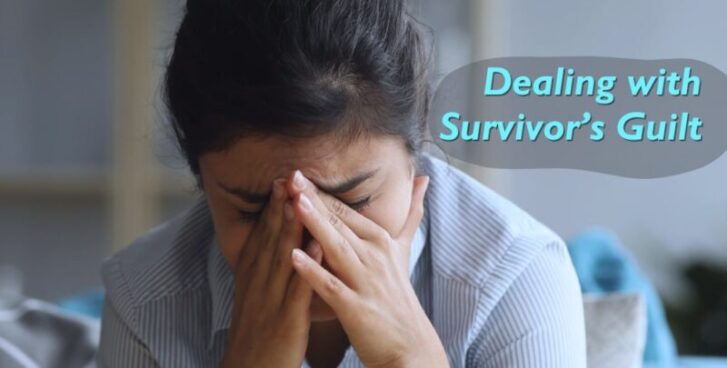The experience of losing a loved one is often a very painful experience. Whether the loss was natural or due to something completely unexpected, outliving those around you repeatedly triggers overwhelming emotions.
‘Survivor’s guilt’ is a psychological condition that is most commonly associated with individuals who are there first during a crisis. An examples of these individuals are: Police officers, soldiers, firefighters etc… Survivors guilt may also be associated with those who have survived traumatic events or lost people who are close to them.
Survivor’s guilt exhibits various symptoms based on the reasoning for the trauma caused, often leading to feelings of deep sorrow, disbelief, and occasionally even a sense of accountability. It’s crucial to understand the process of how survivor’s guilt develops, the strategies to manage it, and where to find appropriate help, to successfully navigate through this challenging condition.
Understanding the Concept of Survivor’s Guilt
Survivor’s remorse, often termed “survivor syndrome,” refers to a psychological state experienced by an individual who has survived a traumatic event that caused harm to others but left the individual in question unharmed.
However, this survivor is usually afflicted with emotional traumas resulting from witnessing the incident. Someone grappling with survivor’s remorse typically wonders, “Why was I spared?” or “Could I have acted differently?”.
Survivors’ remorse is considered a significant symptom of post-traumatic stress disorder (PTSD).
Survivor’s Remorse: Common Indicators
The indicators of survivor’s remorse vary from person to person, including the types and intensity of symptoms. They can also be influenced by the nature of the traumatic event. Typical signs of survivor’s remorse are similar to those of PTSD. Here are the symptoms of people who suffer from PTSD:
- A sense of guilt for being alive when others weren’t
- A never ending cycle of rethinking of one’s actions during the incident
- Irritability and emotional volatility
- A feeling of powerlessness
- Social withdrawal or difficulties
- Suicidal thoughts
- Difficulty sleeping
- Depressive symptoms and lack of drive
- Physical symptoms like headaches, stomachaches, etc.
- Vivid recollections of the incident that led to suffering from PTSD
These symptoms can originate from, or be strengthened by, an individual’s previous traumatic experiences such as childhood abuse, depression, genetic predispositions, and substance misuse.
Managing Guilt
Recognizing the existence of survivor’s remorse is a vital step for the individual suffering from it. It’s capable of affecting everyday life and work performance, making it crucial to find effective coping mechanisms before the symptoms escalate. This process can take time, and it can take even longer without early intervention.
Each individual grapple differently with their symptoms. While some see significant improvement in their symptoms, or their complete disappearance, within a year, others experience them for a very long time. Building a robust support network after recognizing the problem is crucial to long-term recovery and mitigating the risk of relapse.
Allowing time to grieve for the individuals lost in the event can be challenging, but it’s a crucial part of the coping process. Essentially, by accepting and confronting the trauma, they can progress.
Once the problem has been recognized, sufferers and their families must understand that resorting to substance abuse, including drugs and alcohol, is not a valid coping strategy. This can in fact gravely impact the recovery process in a negative way.
Receiving high-quality treatment, which includes dual diagnosis care – a fundamental part of the treatment program offered at our Mental Health Center, is crucial for progression.
What are the two types of survivor guilt?
It can generally be classified into two types:
- Event-based: This type occurs after a specific traumatic event, such as a car crash, natural disaster, war, or any incident where the individual survived but the others did not. In such cases, survivors may feel guilty for being alive, having avoided injury, or not being able to save or prevent harm to others. They may constantly question why they survived when others did not and may feel undeserving of survival.
- Existential: This type is less associated with a specific event and is connected to broader life experiences. It can occur when a person feels guilty for having more success, happiness, wealth, or health than others, especially when comparing themselves to those who are less fortunate. For example, an individual might feel guilty for living a comfortable life when others around the world are suffering from poverty or illness.
While the victims feelings and thoughts in both types of Survivor’s guilt are often irrational, they are real and can be profoundly impactful, often making the need for therapeutic support for those affected a necessity. It’s important to remember that everyone copes differently, and professional help can provide individuals with the necessary tools and knowledge to navigate their feelings.
Why is survivor guilt irrational?
Survivors’ guilt is seen as irrational due to it involving individuals feeling responsible for events beyond their control. A person may experience survivor’s guilt after an event where they survived while others didn’t, leading to feelings of guilt and shame for simply being alive or not having done enough, even when they had little to no control over the outcome.
For instance, a person may feel guilty for surviving a car accident while others were fatally injured, even though they were not driving or had no control over the circumstances leading to the accident. They may irrationally believe that they should have been able to do something to prevent the accident or save the others, which in reality, was certainly beyond their control.
Additionally, some may feel guilt for not being present during the incident or not suffering the same fate as the deceased, which are also circumstances beyond one’s control. This belief system ignores the unpredictability of a lot of tragic incidents and instead attributes blame to oneself, thus making it irrational.
However, it’s important to remember that even if the feelings associated are based on irrational beliefs, the emotions themselves are very real and can be shockingly distressing. These emotions, more often than not, require compassion, understanding and professional support to overcome.
Seeking Treatment Through Professional Assistance
Given the connection between survivor’s remorse and PTSD, procuring a professional evaluation becomes a necessity. While there’s no single magical solution or specific therapy capable of eradicating emotional distress, the first step is to adopt coping strategies.
Some instances may require the use of antidepressants or other pharmacological interventions, particularly when anxiety or depression is present. In other scenarios, the individual may have a history of suicidal ideation or attempts, necessitating further specialized clinical care.
In essence, remorse can be a mix of present trauma and the resurfacing of past traumatic experiences. Sometimes the only viable path towards managing these ongoing traumas and progressing in life involves the intervention of professional assistance.
It’s paramount for those afflicted, and their loved ones, to understand that seeking help is neither wrong nor a cause for shame. Postponing this necessary assistance can further complicate the process and heighten the risk of potential future relapses.
If you or a dear one is wrestling with remorse, create space for a conversation with a therapist to initiate the journey towards authentic healing. The Mental Health Center at Destination Hope offers individualized, patient-centered programs to assist you in managing your conditions and leading a more fulfilling and healthier life.
Survivors’ guilt examples:
It can manifest in various situations, here are a few examples:
- Natural Disasters: A person who survives a natural disaster like an earthquake, hurricane, or flood may experience guilt for surviving when others did not. They may also experience guilt for not being able to do more to help others during the event.
- Military Combat: Veterans often experience it after returning from combat or war. They may feel guilty for surviving when their fellow soldiers did not, or for actions they may or may not have took during combat situations.
- Health Crises: A person who survives a serious illness like cancer may feel guilty when others with the same diagnosis do not survive. They may wonder why they lived while others did not.
- Accidents: If someone survives a car crash or other accident in which others were severely injured or died, they might experience feelings of guilt for surviving or for not being able to prevent the accident.
- Success or Advancement: A person may feel guilty for achieving success or advancement in life when their peers do not. This can occur in the workplace or in a socio-economic context, where an individual moves out of a challenging neighborhood or situation while others remain in the same spot.
- Historical Tragedies: Survivors of horrific events like the Holocaust, genocides, or other mass atrocities often live with deep feelings of guilt for having survived while so many others perished.
- Pandemics: During a pandemic, those who get mildly sick or remain healthy might feel guilty about their good health when others are severely ill or dying. Healthcare workers may also experience not being able to save all their patients, even though it was beyond their control.
These examples highlight the wide-ranging circumstances that Survivor’s guilt victims have often experienced. The guilt is rooted in irrational feelings of responsibility for events beyond one’s control. Gaining an understanding of why one may be experiencing symptoms of this condition is a significant step towards managing these emotions.
What to say to someone with survivor’s guilt?
When interacting with someone dealing with survivor’s guilt, it’s essential to approach them with empathy, patience, and understanding. Here are some good examples for what you might say:
- “Your feelings are valid.” Acknowledge their emotions. Even if it is irrational, their feelings are real and should be validated.
- “You’re not alone in this.” Assure them that many people experience guilt. It can be comforting to know that they’re not alone and that others understand what they’re going through.
- “It’s okay to grieve.” Encourage them to express their feelings of grief. It’s a normal and necessary part of the healing process.
- “Surviving isn’t something you need to feel guilty about.” Help them understand that survival isn’t a choice and it’s not their fault that they survived when others did not.
- “You did the best you could.” Reinforce the fact that they did everything they could in the circumstances they were in. Remind them that they are not at fault for what happened.
- “It’s okay to seek professional help.” Encourage them to speak with a mental health professional. Therapists and counselors can provide useful tools and strategies to help manage and overcome their suffering.
Remember, it’s not about fixing their feelings but providing support and understanding. Listen actively to what they’re sharing, show empathy, and avoid rushing them through their process. Every person’s journey with survivor’s guilt is unique and requires their own pace and path for healing.
Related Posts:
- Understanding, Confronting, and Overcoming This…
- Understanding Attachment Styles and Their Influence…
- Family Support in Mental Health Treatment:…
- Understanding How HGH Influences Mental Well-Being:…
- Unveiling Psoriatic Arthritis: A Journey Into…
- Understanding Schizophrenia: A Guide for Men's Mental Health


















